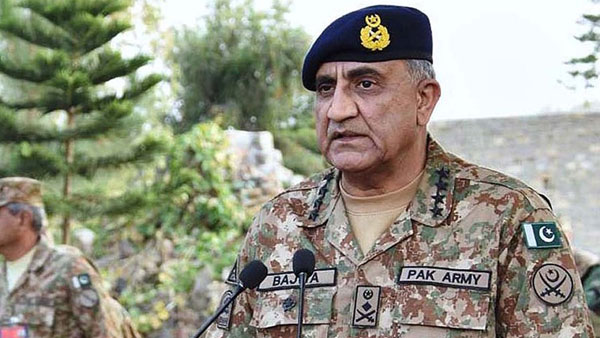Pakistan Army chief Bajwa visits Saudi Arabia
 RIYADH: Pakistan’s army chief visited Saudi Arabia on Monday in an effort to ease a row between the two countries over policy towards the disputed region of Kashmir.
RIYADH: Pakistan’s army chief visited Saudi Arabia on Monday in an effort to ease a row between the two countries over policy towards the disputed region of Kashmir.
The argument, brought on by Pakistani demands for Saudi Arabia to take a firmer line against India’s behaviour in Kashmir, has threatened Riyadh’s financial lifeline to Islamabad.
General Qamar Javed Bajwa’s visit was “primarily military-affairs oriented,” the Pakistani army spokesman said. But Pakistani military and government officials told Reuters Bajwa would try to calm a situation that if not reversed could badly hurt Pakistan’s central bank foreign reserves.
The Saudi Chief of General Staff Maj. Gen. Fayyad bin Hammad Al-Ruwaili received Bajwa in Riyadh on Monday, the Saudi ministry of defence said in a statement on its website.
“During their meeting, they discussed prospects of military cooperation and ways to boost it as well as other topics of common interest,” the statement said. A traditional ally, Saudi Arabia gave Pakistan a $3 billion loan and $3.2 billion oil credit facility to help its balance of payments crisis in late 2018.
Irked by Islamabad’s demands for Riyadh to convene a high-level meeting to highlight arch-rival India’s alleged human rights violations in Kashmir, Saudi Arabia has forced Pakistan to pay back $1 billion early and is demanding another $1 billion of the loan.
The Saudi government media office did not immediately respond to a Reuters’ request for comments on the issue. Riyadh has also not responded to Pakistani requests to extend the oil facility, military and finance ministry officials have told Reuters.
“I think our case is to convince them [Saudi] that there’s no foreign policy shift,” a senior Pakistani military official said.India and Pakistan have fought three wars over the divided Himalayan region of Kashmir, which both claim in full.
The Saudi-led Organization of Islamic Countries (OIC) has only held low-level meetings over Kashmir despite Islamabad’s demands.
Analysts say Saudi Arabia does not want risk its business interests in India for supporting Pakistan over Kashmir. Riyadh might also have reservations over its foe Iran’s possible inclusion in the China Pakistan Economic Corridor (CPEC), part of Beijing’s Belt and Road Initiative, they said.
Foreign Minister Shah Mahmood Qureshi said last week that if Saudi Arabia did not convene a meeting on Kashmir, then Pakistan might call one involving Islamic countries that supported it on the issue.
Last year Islamabad withdrew from a forum of Muslim nations at the last minute on the insistence of Riyadh, which saw the gathering as an attempt to challenge Saudi’s OIC leadership.
Hafiz Tahir Ashrafi, an influential Pakistani cleric, who went to Riyadh ahead of the general’s visit, was optimistic, saying Saudi King Salman bib Abdul Aziz and Crown Price Mohammad bin Salman have a long history of good relations with Pakistan.
Meanwhile, Pakistan’s army spokesman said General Qamar Javed Bajwa’s visit on Monday was “primarily military-affairs oriented”, The military declined to comment to Al Jazeera on the agenda for the visit.
But Pakistani military and government officials told Reuters news agency that Bajwa would use his good offices to try to calm the situation, which could badly hurt Pakistan’s central bank foreign reserves if not reversed.
Despite repeated requests from Pakistan to hold a foreign ministers’ meeting on Kashmir, the Jeddah-based Organisation of Islamic Cooperation has shown reluctance to convene such a conference, prompting an upset Islamabad to threaten that it may call a separate gathering on the issue.
Diplomatic sources here said that Gen Bajwa was accompanied by the Inter-Services Intelligence (ISI) chief Lt Gen Faiz Hameed. The details of their engagements in Saudi Arabia have not been released, but the two are expected to hold high-level meetings to iron out misgivings.
Pakistan has been pushing the 57-member organisation, which is the second largest intergovernmental body after the UN, for the foreign ministers’ meeting since India revoked the special status of Jammu and Kashmir in August last year.
However, there has not been any positive response from the OIC, the biggest bloc of Islamic countries in the world, to Pakistan’s request so far.
A major reason behind the OIC’s inaction has been Saudi Arabia’s reluctance to accept Pakistan’s request for holding a meeting specifically on Kashmir. Riyadh’s support is crucial for any move at the OIC, which is dominated by Saudi Arabia and other Arab countries.
Pakistan has been unsuccessfully trying to drum up international support against India for withdrawing Jammu and Kashmir’s special status.
India has categorically told the international community that the scrapping of Article 370 of the Constitution was its internal matter. It also advised Pakistan to accept reality and stop all anti-India propaganda.
“If you cannot convene it, then I’ll be compelled to ask Prime Minister Imran Khan to call a meeting of the Islamic countries that are ready to stand with us on the issue of Kashmir and support the oppressed Kashmiris,” Pakistan’s Foreign Minister Shah Mahmood Qureshi told local media in recent weeks.
Foreign Minister Shah Mahmood Qureshi, for the first time, criticised the Saudi government in a recent TV interview and threatened to call an OIC meeting by sidestepping the Gulf country.
(With Agency Inputs ).

